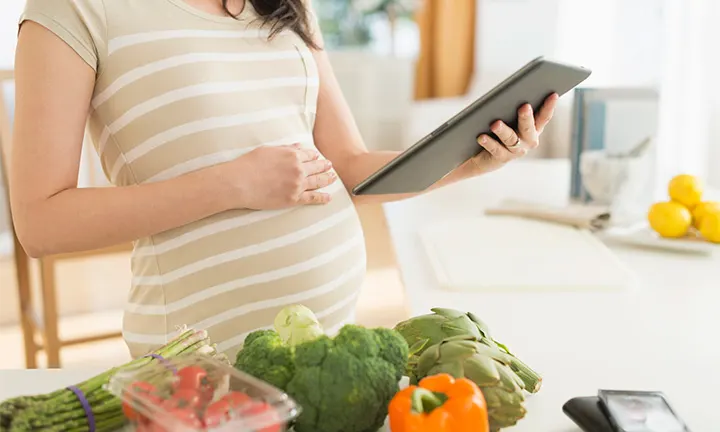

Verified by Dr. Sandip Sonara
Advanced gynec Laparoscopic & Gynec Onco Surgeon
What is Nutrition?
Nutrition is food that gives your body what it needs to stay healthy and work properly. The main nutrients your body needs are proteins, carbohydrates, healthy fats, vitamins and minerals.
Nutrition when Trying to Get Pregnant (Conceive)
What you eat can affect your fertility (your chances of getting pregnant). Other things can affect your chance of getting pregnant, such as smoking or having certain health conditions. Dr. Sandip Sonara is best fertility doctor in Ahmedabad, they provide the best and most healthy diet to Improve Your Fertility Health.
Best Food That Improve Your Fertility Health
The best foods for getting pregnant (conceiving) are the same as those for general health.
This means eating whole grains, healthy fats, and proteins.
To have the best pre pregnancy nutrition, try to:
- Base meals on starchy food (for example bread, rice, pasta, potatoes), choosing wholegrain if possible.
- Eat fibre-rich foods (for example fruit, vegetables, oats, beans, peas, lentils).
- Eat at least 5 portions of different nutritious fruits and vegetables each day.
- Eat a low-fat diet.
- Eat as little as possible of fried food, drinks, and sweets with added sugar (cakes, fizzy drinks), and other foods high in fat and sugar.
- Eat a healthy breakfast.
Be aware of portion sizes of meals and snacks and how often you eat.
If you’re trying to conceive or planning on growing your family shortly, you may have fertility on your mind—especially if you’ve had friends or family members who’ve struggled to get pregnant.
Perhaps you’re even in the midst of an infertility journey yourself. If so, please know you’re not alone. Fertility has been on the decline globally in recent years and today, infertility affects at least 50 million couples worldwide. Fertility has declined by 45% in women ages 20-24 years and the last fifty years, sperm count in men has declined by 50% globally.
But don’t let those numbers scare you—fortunately, there are steps you can take to enhance your fertility.
So, what affects fertility and what can we do to improve it? One factor you may not have considered is diet.
Common Causes of Infertility
Although our main focus here is the link between diet and fertility, many causes of infertility are not related to what we eat. Medical conditions, environment, social determinants of health, and lifestyle factors all impact our fertility.
Below are a few of the most common factors that can cause infertility:
- Ovulation disorders. Conditions like PCOS, thyroid disorders, hyperprolactinemia, RED-S, and eating disorders can impact ovulation, which impacts fertility.
- Fallopian tube damage or blockage. Pelvic inflammatory disease, endometriosis, and salpingitis can cause damage or blockage in the fallopian tubes and impact fertility.
- Endometriosis
- Uterine or cervical abnormalities. Fibroids, cervix abnormalities, uterine polyps, or uterus shape can impact fertility.
- Cancer and its treatment. For all genders, tumors, chemotherapy, and radiation can all impact fertility.
- Primary ovarian insufficiency (early menopause)
- Pelvic adhesions (scar tissue)
- Abnormal sperm production or function. Genetic defects, infections (STDs and HIV), undescended testicles, and diabetes may impact sperm production and function.
- Overexposure to certain environmental factors. Pesticides, radiation, chemicals, steroids, nicotine, frequent heat exposure, marijuana, and certain medications may impact sperm production.
- Issues with sperm delivery
- Age
- Alcohol and drug usage
- Undereating or eating disorders
- Stress and sleep issues
- Overexercising
Where does Nutrition Come into Play?
Research shows that a diet high in unsaturated fats, whole grains and legumes, fruits and veggies, a variety of protein sources and full-fat dairy may improve fertility in all genders. If you’re looking to improve your fertility, focus on incorporating these foods into your diet:
- Unsaturated fats (avocados, olives, canola and olive oils, nuts, seeds, peanuts)
- Whole grains and legumes (beans, chickpeas, oats, farro, corn, arrowroot, quinoa)
- Fruits and veggies (aim for a colorful plate)
- Variety of protein sources (with an emphasis on more plant-based protein sources)
- Full-fat dairy (milk, cheese, yogurt)
The importance of iron and Folic Acid in Protein
It’s also important to make sure you’re consuming enough iron and folic acid. Research shows adequate intake of these nutrients may help you get pregnant and stay pregnant. Supplementing with a prenatal vitamin when you’re trying to conceive may also be beneficial. Ask your OBGYN if they have any supplement recommendations.
To increase your intake of iron, add these foods to your rotation:
- Beans
- Peas
- Poultry
- Eggs
- Fish
- Beef
- Pork
- Broccoli
- Dried fruits
- The following foods can help boost your folic acid intake:
- Dark leafy greens
- Whole grains
- Citrus
- Lentils
- Nuts
- Seeds
- Avocados
- Bell peppers
Are you Eating Enough?
Undereating has also been shown to decrease fertility. Ensuring that you are eating three meals a day and incorporating foods with carbs, fats and proteins into your diet is crucial to proper nutrition.
Nutritional deficiencies can prevent you from being able to conceive, as well as negatively impact your pregnancy after conception. Dieting or weight loss while trying to get pregnant and throughout the pregnancy is not recommended and may increase the risk of miscarriage or health conditions during pregnancy.
Talk to your OBGYN about getting tested for nutritional deficiencies like vitamin B12, iron, and folate if you are trying to get pregnant.
Keep in mind that nutrition isn’t the end all be all of fertility. Nutrition cannot cure disease. There are many factors that play into fertility, so make sure you and your doctor are looking at the full picture. Choosing a variety of foods can help nourish your body for a healthy pregnancy but don’t neglect other aspects of your health like sleep, stress and exercise level.
If you have a condition like PCOS or endometriosis, these foods listed above can be helpful for conceiving, but they are not specific guidelines for these conditions. Make sure you talk with a dietician and your OBGYN about ways to improve your fertility.
Foods to Avoid while Trying to Get Pregnant
There are some foods and drinks that it is best to avoid or limit because of possible risks to your baby during pregnancy.
If you are actively trying to get pregnant, it is a good idea to try and avoid eating these foods now.
Do not worry if you have recently eaten anything on this list before finding out that you are pregnant. It is unlikely to have affected you or your baby. Talk to your doctor or midwife if you are worried.
Having a Healthy Diet for a Healthy Weight
Eating well and staying active can help you maintain a healthy weight. This is important because being a healthy weight can improve your chances of getting pregnant (your fertility) and reduce the risk of pregnancy complications.
Other factors can contribute to your weight, other than your diet. We have more information about being overweight and getting pregnant and being underweight and getting pregnant.
Read more about Pregnancy Health Tips for Entire 9 Months.